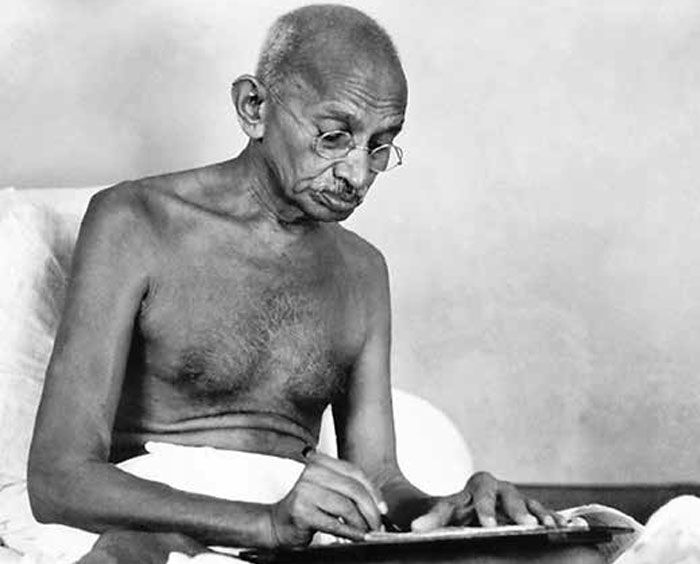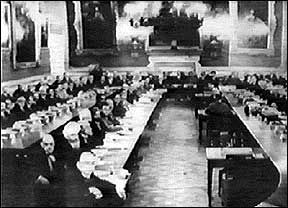
Fast against Separate Electorate
On September 20, 1932, Gandhiji went on a fast protesting against a separate electorate for Harijans. In his words, such 'separation would kill all prospects of reform'; 'when a man relies on a support, to that extent he weakens himself

Government of India Act, 1935
On August 2, 1935, The Government of India Act, 1935 was passed. It laid down the constitutional framework for the governance of British India at the federal and provincial levels.

Khadi becomes compulosry
A number of changes in the Congress constitution were affected at the Bombay Session in 1934. Wearing of Khadi was made a necessary criterion for elective membership. A cap of 2000 was put for the number of Congress delegates. A. I. C. C. was reduced to half its strength. The delegates were to be elected at the rate of 1 per every 500 primary members, thereby making them representatives of the people.

The Third Round Table Conference
The Third Round Table Conference began on November 17, 1932 and continued up to December 24, 1932. The Congress boycotted it.

Poona Pact
Gandhiji ended his fast against against separate electorates for Harijans. This was after a pact was reached between him and Dr BR Ambedekar that allowed a certain number of reserved seats for Harijans

Communal Award
On August 16, 1932, the British Government announced that members to the provincial legislatures would be elected from separate electorates/constituencies, which would primarily be demarcated on a communal basis.

Congress braves crackdown
Despite Police vigilance, over 500 delegates attended the Congress session in Delhi in April 1932. Pandit Madan Mohan Malaviya, the President elect was arrested en-route. Four resolutions were passed reiterating complete Independence as the goal of the Congress, endorsing the revival of Civil Disobedience, expressing complete faith in Gandhiji's leadership and reaffirming deep faith in non-violence.

Civil Disobedience Revived
Lord Willingdon became the Viceroy in Nov 1931. He violated the Gandhi-Irwin Pact by repressing Congress and other nationalists. Hence, Congress revived the civil disobedience movement on 4 Jan 1932

2nd Round Table Conf.
The deliberations of the conference that started on September 7, 1931, failed to bring about a consensus between Gandhiji and other Indian participants on separate electorates and other safeguards for Muslims and other minorities.

Karachi Session, 1931
The Congress expressed its admiration of the bravery and sacrifice of Bhagat Singh, Sukhdev and Rajguru who were executed on March 23, 1931, while also voicing its disapproval of political violence. They declared the execution of the three young men to be an act of wanton vengeance.

Gandhi Irwin Pact
Gandhiji entered into a pact with the then Viceroy, Lord Irwin, thereby agreeing to discontinue the civil disobedience movement and participate in the Round Table Conferences, on Irwin's acceptance to withdraw the Salt tax and ordinances and cases against the Congress and other nationalists.

1st Round Table Conference
The conference, chaired by the British PM, Ramsay MacDonald, discussed constitutional issues pertaining to India. The Congress did not attend the Conference as its leaders were in jail for civil disobedience.
Dandi March
On March 12, 1930, Gandhiji started his Dandi March (Salt Satyagraha) from his residence at Sabarmati protesting against the 1882 Salt Act, which gave the British a monopoly on the collection, storage and trade of salt, and which levied a salt tax. On Apr 6, 1930, Gandhiji broke Salt laws at Dandi.
Purna Swaraj is the Goal
With Pandit Jawaharlal Nehru at the helm, the Congress went a step declaring Purna Swaraj (complete independence) as its ultimate goal. “We long for peace and the hand of fellowship will always be stretched but to all who may care to grasp it. But behind the hand will be a body which will not bend to injustice and a mind that will not surrender on any vital point,” Pandit Nehru said during his presidential address.

Dominion Status
During the Calcutta session,Gandhiji moved a resolution accepting the Motilal Nehru report's recommendation of Dominion Status within two years. However, Jawaharlal Nehru moved an amendment reiterating the Congress's commitment to independence. To arrive at a middle ground, the Congress gave the British a warning that a civil disobedience movement would start if India was not granted dominion status by December 31, 1929.

Bardoli Satyagraha
On February 12 1928, Sardar Patel under Gandhi's leadership launched a Satyagraha in Bardoli against high taxes on farmers who were already reeling under floods and famine. It continued up till August 6, 1928, when an agreement was arrived at with the government.

Congress decides to boycott the Simon Commission
At the 1927 Madras Session, the Congress resolved to boycott the Simon Commission "at each stage and in every form". In a separate resolution, the Creed of the Congress was defined: "the goal of the Indian people is complete National Independence"







